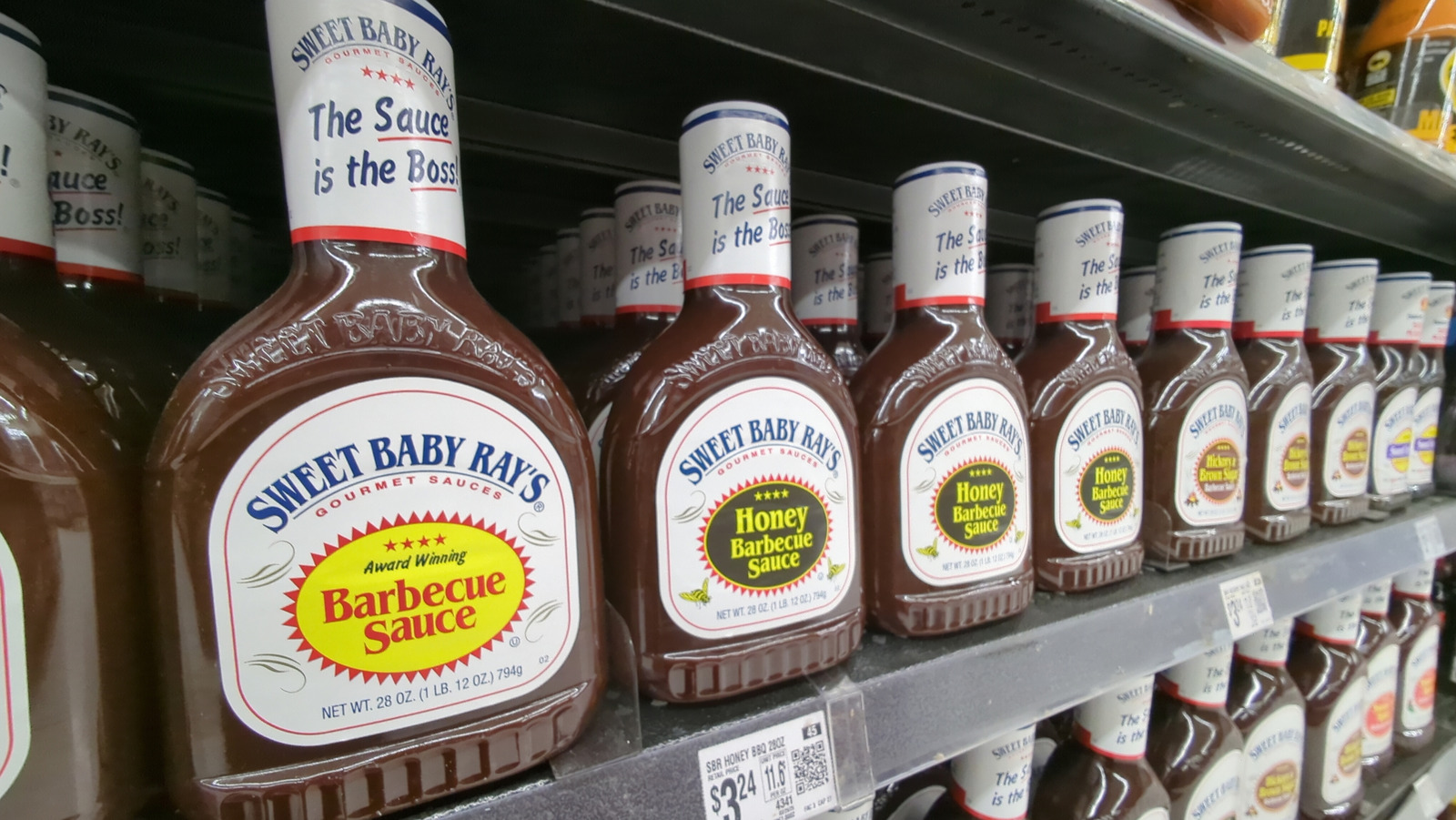If you’re stocking up on essentials for an upcoming barbecue, there are some things that you’ll absolutely want to add to your cart. Plates, napkins (ribs can be messy!), ketchup, and drinks are must-haves, as well as one condiment that outdoor cooking enthusiasts likely know all too well: barbecue sauce. There are so many different variations of barbecue sauce available at the grocery store, including tomato-forward, acidic, thick, thin, hot, mild, and seemingly every sauce in between. If you have a tried-and-true barbecue sauce brand that you absolutely love, then you might be in the minority — because the rest of us are playing a culinary game of Russian roulette to try and find a flavorful sauce that hits all the flavor marks and elevates our protein of choice.
The good news is that even if you buy a store-bought barbecue sauce that’s not to your liking, you can easily transform and balance out its flavors by adding one (or more) extra ingredients to it. We curated a list of some of the pantry staples you should consider adding to your store-bought barbecue sauce, whether you need to make the texture thinner or thicker, want to drive home the sweetness, or offer some unique, umami contrast to better complement whatever you’re eating it with.
Stir in your favorite fruit preserves for a sweet touch
If there’s one thing store-bought barbecue sauce often lacks, it’s depth. If your sauce is looking especially thin or otherwise uninteresting, consider grabbing a jar of fruit preserves from your cabinet (or the grocery store). This common toast topping can offer your sauce a fuller, more unique mouthfeel and also thicken it up.
As you can probably already expect, not all fruit preserves are a good fit for a barbecue sauce. You need flavors that will uplift the ingredients in the sauce and work well with whatever you’re putting it on. Ideally, you’ll want to get no-sugar-added preserves to avoid making an already sweet barbecue sauce any more cloying than it needs to be. Apricot jam is one place to start; its flavor is mild with undercurrents of honey. You can also try a couple of teaspoons of peach preserves. They’re an especially delicious pairing for a bourbon barbecue sauce, since the oaky and vanilla undertones will play off the peach’s sweetness well.
Add depth and complexity with miso paste
Miso paste is one funky ferment that we always keep on hand. This ingredient has been rising in popularity in recent years thanks to its versatility and unique flavor. Miso comes in three types: white, yellow, and red. The darker the color, the more robust the flavor. Miso is both salty and umami, meaning that it’s in good company with other common barbecue sauce ingredients, including brown sugar, maple syrup, and soy sauce.
You may want to consider adding a spoonful of miso to your store-bought barbecue sauce if you’re after a bolder flavor and a more pronounced saltiness. Since miso is already pretty salty on its own, you’ll want to avoid being too heavy-handed with it, as adding too much can upset the balance of your barbecue sauce. You’ll also want to whisk it well into the sauce — or even consider putting the sauce and the miso together in a blender — to ensure that the paste is well-incorporated and that it infuses into your concoction. Otherwise, it may just sink to the bottom of your mixture.
Give your barbecue sauce a Korean twist with gochujang
One way to give your store-bought barbecue sauce a spicy, Korean-inspired twist is to add a teaspoon or so of gochujang to it. This spicy condiment is made with Korean chili paste, which gives it its fiery bite, along with a base of fermented soybeans, rice, and oil. We liken it to miso’s hot cousin. The two have a similar consistency, but gochujang just offers more of a lingering burn, making it perfect for spice lovers.
A little gochujang goes a long way, so you don’t have to add too much of it to your sauce to have a big impact on its flavor. It’s also a warmth that builds over time, so while your first bite may be underwhelming, subsequent ones will likely prove to be hotter. We recommend adding gochujang to an Asian-inspired barbecue sauce, like one that you would use for homemade Korean barbecue. It would also be an excellent topping for a rack of baby back ribs, paired with tangy and bright cabbage slaw. The cool, creamy topping is the perfect contrast to the spice-filled sauce.
Add honey or maple syrup for extra sweetness
Does store-bought barbecue sauce usually need to be sweeter? Likely not. But tons of the ways to perk up a lackluster barbecue sauce involve sweeteners, so you may want to pick and choose your battles here. Honey, for example, can offer a delectably floral flavor to your barbecue sauce, along with a slight hint of acidity. Maple syrup has a more oaky profile, which would work well with a boozy, bourbon- or whiskey-infused sauce, smothered on wings or ribs.
You don’t need to add a ton of sweetener to your sauce to taste its effects. In fact, we’d recommend that you taste your sauce before you add any sweeteners, as it’s so easy to shift it off balance and make it too cloying. Plus, adding extra sugar might affect its caramelization (and thus, the possibility of burning), so you may want to save the super sweet, maple- or honey-infused sauces for dipping rather than grilling.
Use pineapple juice for acidity
If you have a barbecue sauce that is either too sweet or too hot, you’re going to want to reach for something acidic — like pineapple juice. This juice is an excellent alternative to other acids, like vinegar or lemon juice, because it will add more complexity to your sauce while also balancing its errant flavors. There are some sweet undertones to the sauce to help dial back its acidity, though its sweetness is not as pronounced as other additions, like brown sugar, maple syrup, or honey.
A pineapple juice-infused barbecue sauce would be excellent on anything pork-adjacent, be it slow cooker pulled pork sliders or pork ribs. You can even use a pineapple-infused store-bought barbecue sauce for carne asada tacos or a protein topped with a mango and pineapple salsa. Just be sure to only add a few teaspoons of the juice at a time. Since the juice is liquid, it’s easy to make your sauce too thin.
Give barbecue sauce a boozy twist with bourbon
Bourbon and barbecue go hand-in-hand. The spirit is the secret to a next-level marinade, and it turns out that it can also transform even the most lackluster of store-bought barbecue sauces, too. Bourbon tends to be oaky, smoky, and almost mapley, which pairs well with a brown sugar-based barbecue sauce. Its sweetness can also balance out a sauce that’s more acidic or one where the tomato flavor is front and center. Plus, the smokiness plays well off an array of smoked and grilled meats.
Like other liquid additions, you don’t want to add too much bourbon to your barbecue sauce. Since it’s a spirit, it can also impart a slightly boozy flavor to your sauce, so it’s one that’s best doused on meats and proteins destined for the grill, rather than used as a condiment. That way, some of the alcohol can cook off before you dive into it.
Use liquid smoke for a bolder flavor
Liquid smoke is an ingredient that you should keep in your pantry even if you don’t grill very often. It has a concentrated smoke flavor that’s tailored to the type of wood that it’s made with. You’ll find an array of varieties, like mesquite, applewood, and hickory, available at your local grocery store. It’s a worthwhile item to grab if your store-bought barbecue sauce is falling flat on the smokiness front.
You’ll want to select a liquid smoke that complements the flavors of your sauce and the protein you’re grilling with. For example, extra flavorful ribs, smoked with hickory or mesquite, would benefit from a barbecue sauce that emulates those same aromatic compounds. The key, and perhaps the most important thing to note when it comes to liquid smoke, though, is that a little goes a long way. It can quickly overtake the flavor of a barbecue sauce, so stick to using less than a teaspoon of it in your sauce.
Stir in smoked paprika for extra warmth
Smoked paprika is one of the best seasonings that you can have on hand — and it really comes in handy for occasions like upgrading your store-bought barbecue sauce. It’s not the same thing as sweet paprika (which can be marketed as just “paprika”), as the former is made with smoked peppers. This gives the peppers a stronger and more robust flavor and makes the seasoning better-suited for pairing with heavy grilled meats and foods where you want those earthy notes to shine, like in a barbecue sauce.
One of our favorite uses for this seasoning is to make plant-based proteins taste meatier. For example, you may want to add it to a barbecue sauce that’s destined for a plate of jackfruit pulled pork or maitake mushrooms. The smoked paprika will make the flavor of the sauce a little heartier and help to complement the pulled pork alternatives.
Mix in your favorite hot sauce
Some like it hot, and they’re also probably the people who are no strangers to hot sauce. There is no shortage of store-bought hot sauces that are actually worth your pantry space, so you’ll have a ton of options when it comes to deciding which one to mix with your barbecue sauce to give it a spicy twist. The nice thing about hot sauce is that while its primary purpose is bringing the heat, it can also introduce flavor nuances, depending on the type of peppers it’s made with and the other ingredients it includes. For example, you can use a garlicky hot sauce to give your barbecue sauce a spicy and allium-forward flavor. Or if you like a flavor that’s a little more earthy, opt for a hot sauce made with smoked peppers.
The amount of hot sauce you’ll want to add to your barbecue sauce will really depend on two things: its initial heat level and how much heat you can tolerate. So, start with a little squirt and go from there.
Use canned chipotles in adobo for heat and warmth
Canned chipotles in adobo are an ingredient that we honestly don’t think about until we see them in the canned or international food aisle of our local grocery store — and inevitably add to our cart. The chiles, which are actually jalapeños, are canned with a sweet and umami sauce made with ingredients like tomato paste, vinegar, garlic, and spices. Based on the sauce, you can probably see where we’re headed here. Using just the adobo from the can will elevate a store-bought barbecue sauce that’s lacking body all around; the sweetness and umami undertones from the tomatoes will bolster the existing flavors in a classic barbecue sauce, while the spices and chipotle residue will add a spicy pop to every bite.
If you’re taking the chiles and sauce directly from the can, you may want to purée the mixture before you add it to your barbecue sauce. That way, the chipotles will be well-distributed and will better infuse with the thick barbecue sauce. Slather it on wings, ribs, and more.
Amp up the umami flavor with Worcestershire sauce
Worcestershire sauce is a common steak seasoning, and it turns out that it’s a great match for other grilled proteins, too. It’s a complex ingredient, as it gets its umami from anchovies, tang from the vinegar, sweetness from molasses, and overall unique flavor from a medley of tamarind and spices. There are few condiments like it, making it a unique and flavorful addition to barbecue sauce that isn’t up to par as is.
You can add a couple of tablespoons of Worcestershire to your store-bought barbecue sauce, give it a stir, taste, and add more as needed. The fishiness is usually pretty subdued, which makes it a versatile sauce enhancer for a variety of proteins and foods. Not only does a Worcestershire-enhanced barbecue sauce make a great dipping accompaniment for chicken tenders and fries, but it can also be used as a flavorful marinade for steak or mushrooms too.
Add apple cider vinegar for a tangy flavor
If your sauce is leaning a little too sweet, one easy way to recalibrate it is to add apple cider vinegar. It’s a chef-approved tip to make store-bought barbecue sauce taste homemade, and you’ll probably be wondering why you didn’t try it sooner.
The key here is to use apple cider vinegar rather than regular ol’ distilled white vinegar. The former has a flavor that works better with meats. Distilled white vinegar may also have more acid than apple cider vinegar, making the apple cider version a better choice if you want to add a less pronounced tang to your barbecue sauce. The notes of sweet fruit in apple cider vinegar play especially well with pork, and you only need to add a bit to your sauce to really taste the difference. Try slathering it on pulled pork or spare ribs.
Stir in ketchup to give your sauce a more tomato-forward flavor
The easiest way to elevate a store-bought condiment? Add other types of store-bought condiments to it.
Ketchup is one of the best all-purpose ingredients to keep in your fridge, and it comes in handy when your barbecue sauce lacks a sweet, tomatoey punch. Ketchup is essentially just a combination of tomato paste, vinegar, salt, and sugar — all of which are common ingredients in most barbecue sauces. When you combine the two together, you can reap the umami, salty, and sweet benefits of the ketchup, paired with the smokier notes of a good barbecue sauce.
As you can probably expect, a ketchup and barbecue sauce mashup is well-suited to dipping, especially for chicken tenders and fries. It could also make an excellent topping for your meatloaf, seeing as how the ketchup is a familiar pairing for the homestyle dinner. The barbecue sauce would also add an extra level of brown sugar sweetness to every bite and make it all the more satisfying.
Add garlic to improve the sauce’s aroma and flavor
The vampires should probably skip over this one, but it’s fair game for everyone else. Garlic, in its many, many forms, is an excellent addition to store-bought barbecue sauce. Fresher forms of the allium, like chopped, fresh garlic or even the stuff in the squeeze bottle, can add sharpness to your store-bought barbecue sauce and draw your palate’s attention to its flavor. Powdered garlic is another option; it’s shelf-stable and easier to mix into your barbecue sauce without leaving behind any clumpy residue.
However, regular garlic isn’t the only form of the allium worth considering. If you’re after a more complex flavor, for example, you may want to try adding roasted garlic to your barbecue sauce instead. Rather than offering a piquant bite, roasted garlic offers a more mellow, almost buttery flavor that will make your store-bought barbecue sauce taste more complex. You can also play with black garlic, a cured form of the allium, which has an umami and slightly sweet flavor instead of that classic, garlicky sting.
Pop open a can of root beer to upgrade your barbecue sauce
Root beer … and barbecue sauce? The fizzy drink is the secret ingredient for flavorful pulled pork, so it’s not that big of a stretch to try and use it in your barbecue sauce, too. The predominant flavor, as any soda aficionado would know, is sweet, but depending on the brand that you buy, you can also get one that’s more acidic or one that has a stronger sarsaparilla undertone. The sweetness can play off the existing flavors, while also adding a subtle oaky profile that will work well with an array of proteins, including chicken, pork, and even brisket.
If you don’t want to add extra liquid to your sauce, you may want to consider cooking your root beer down to remove some of the excess moisture and concentrate its sugary profile. Just beware that doing so may put your soda at risk of burning, so you’ll need to keep a watchful eye over it as it reduces. You could also add a couple tablespoons straight from the can to thin out your sauce; just make sure you don’t add it to a barbecue sauce that’s sugary and cloying already. Otherwise, you’ll risk overwhelming it even more.





